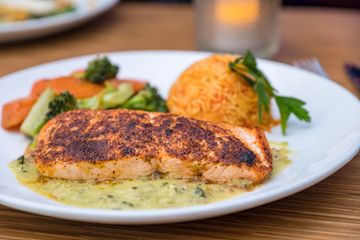End your meal with sweet churros served with sugar glaze sauce
Is Mexican Food Healthy? Unboxing the Nutritional Advantages of Conventional Active Ingredients
The concern of whether Mexican food is healthy welcomes an exploration of its standard components. Beans and corn work as fundamental staples, rich in healthy protein and fiber. Avocados supply helpful fats, while different herbs and flavors include taste and health advantages - happy hour. With each other, these parts produce a tapestry of nourishment. The healthfulness of Mexican cuisine usually depends on preparation approaches and section dimensions. What function do these aspects play in identifying its total dietary worth?
The Power of Beans: Protein and Fiber-Rich Staples
Although usually neglected, beans act as a keystone of Mexican food, offering a riches of dietary advantages. Rich in healthy protein, they are an outstanding plant-based option for those looking for to satisfy their nutritional healthy protein requires. This high healthy protein content supports muscle repair work and growth, making beans vital for both meat-eaters and vegetarians alike. Additionally, beans are an outstanding resource of nutritional fiber, which helps in food digestion and promotes a feeling of fullness, potentially aiding with weight administration.
The range of beans utilized in Mexican recipes, such as black beans, pinto beans, and kidney beans, adds to a diverse taste account and can boost dishes nutritionally. Beans are low in fat and include important vitamins and minerals, including magnesium, folate, and iron. With each other, these characteristics make beans an important component, delivering both nourishment and nutrition in typical Mexican price.
Corn: a Versatile Grain With Nutritional Benefits
Corn sticks out as a flexible grain basic to Mexican food, commemorated not only for its cooking applications but additionally for its excellent nutritional profile. As a key ingredient in meals like tortillas, tamales, and pozole, corn supplies crucial nutrients that add to a well balanced diet regimen. Rich in carbohydrates, it works as a substantial energy source, while additionally being low in fat, making it a positive alternative for various nutritional demands.
Corn is a good source of nutritional fiber, which helps in food digestion and promotes satiation. It includes significant quantities of vitamins such as B-complex vitamins, which are crucial for power metabolic process. The visibility of anti-oxidants, particularly carotenoids, contributes to total health by decreasing oxidative anxiety. Additionally, corn is gluten-free, satisfying those with gluten sensitivities. In general, the dietary advantages of corn underscore its significance in typical Mexican food and its duty in a healthy and balanced diet plan.
Avocados: Healthy Fats and Nutrients in Every Bite
Avocados play a considerable duty in Mexican cuisine, matching dishes with their creamy appearance and abundant flavor. Beyond their cooking allure, avocados are celebrated for their impressive dietary account. They are an abundant resource of healthy and balanced monounsaturated fats, which can assist reduced poor cholesterol levels and support heart health. Furthermore, avocados are loaded with necessary minerals and vitamins, consisting of potassium, vitamin E, and B vitamins, contributing to overall health.
The high fiber material in avocados aids digestion and promotes satiation, making them a useful addition to any type of dish. Their distinct nutrient structure can likewise sustain skin wellness and supply anti-inflammatory benefits. Integrating avocados into conventional Mexican recipes or appreciating them as a standalone snack can boost both flavor and nutrition, showing why they are a cherished staple in Mexican cuisine. In general, avocados offer a scrumptious method to enjoy healthy and balanced fats and important nutrients in every bite.

Spices and Natural Herbs: Flavorful Health And Wellness Boosters
While appreciating the rich flavors of Mexican cuisine, one can not overlook the vital duty that spices and herbs play in enhancing both preference and wellness. Ingredients such as oregano, cilantro, and chili peppers not just add to the vibrant flavor profile yet also offer considerable health and wellness advantages. Cilantro is known for its detoxifying homes, assisting to remove hefty steels from the body, while oregano is loaded with antioxidants and possesses anti-inflammatory effects.
Chili peppers, a staple in many Mexican dishes, contain capsaicin, which has been linked to boosted metabolic process and pain relief. Additionally, spices like cumin and coriander support food digestion and might assist in blood sugar level regulation. Integrating these flavorful health boosters right into meals not only anonymous enhances the culinary experience but also advertises general wellness, making Mexican cuisine not just scrumptious, but also nutritionally advantageous.
Traditional Food Preparation Techniques: Enhancing Nutrition and Flavor
Typical food preparation approaches in Mexican food play a crucial duty in improving both nutrition and flavor, as they usually focus on classic techniques and fresh ingredients. Strategies such as nixtamalization, where corn is soaked and cooked in an alkaline remedy, not only improve the nutrient account of tortillas however also boost their digestibility - take out and delivery. Furthermore, using slow-moving cooking approaches, like stewing or braising, permits flavors to meld perfectly while keeping the honesty of the components

Often Asked Questions
Are Mexican Food Portions Generally Larger Than Various Other Foods?
Mexican food parts are frequently larger than those of several other cuisines. This characteristic mirrors typical dining practices, stressing common sharing and hearty meals, which can bring about a much more substantial offering size in general.
Just how Does the Preparation Approach Affect Healthiness of Mexican Food?
Prep work approaches substantially affect the healthiness of Mexican food. Methods such as grilling or steaming maintain nutrients, while frying can enhance harmful fat material. Choices of active ingredients and cooking styles ultimately figure out overall dietary value.
Can Mexican Food Be Customized for Specific Dietary Limitations?
Mexican food can indeed be tailored for particular nutritional restrictions. Replacements, such as using corn tortillas for gluten-free diet plans or including more veggies, enable individuals to appreciate conventional tastes while suiting various dietary needs.
What Prevail False Impressions Concerning Mexican Food and Wellness?
Typical misconceptions regarding Mexican food consist of the belief that it is naturally undesirable, overly zesty, and entirely concentrated on fats. Actually, conventional meals frequently feature healthy active ingredients and can be customized to various dietary requirements.
Are There Much Healthier Alternatives at Mexican Dining Establishments?
Much healthier options at Mexican restaurants typically consist of smoked meats, beans, and fresh veggies. Picking dishes that emphasize whole ingredients and preventing heavy sauces can cause a much more healthy eating experience, advertising general wellness.
The range of beans utilized in Mexican recipes, such as black beans, pinto beans, and kidney beans, adds to a varied taste account and can improve dishes nutritionally. Avocados play a substantial duty in Mexican food, enhancing meals with their velvety structure and rich flavor. Incorporating avocados into traditional Mexican dishes or enjoying them as a standalone treat can improve both flavor and nutrition, demonstrating why they are a beloved staple in Mexican food. While enjoying the abundant tastes of Mexican cuisine, one can not overlook the essential function that spices and herbs play in improving both applebee's near me taste and health. Typical food preparation techniques in Mexican cuisine play a vital role in boosting both nourishment and flavor, as they frequently focus on classic methods and fresh ingredients.